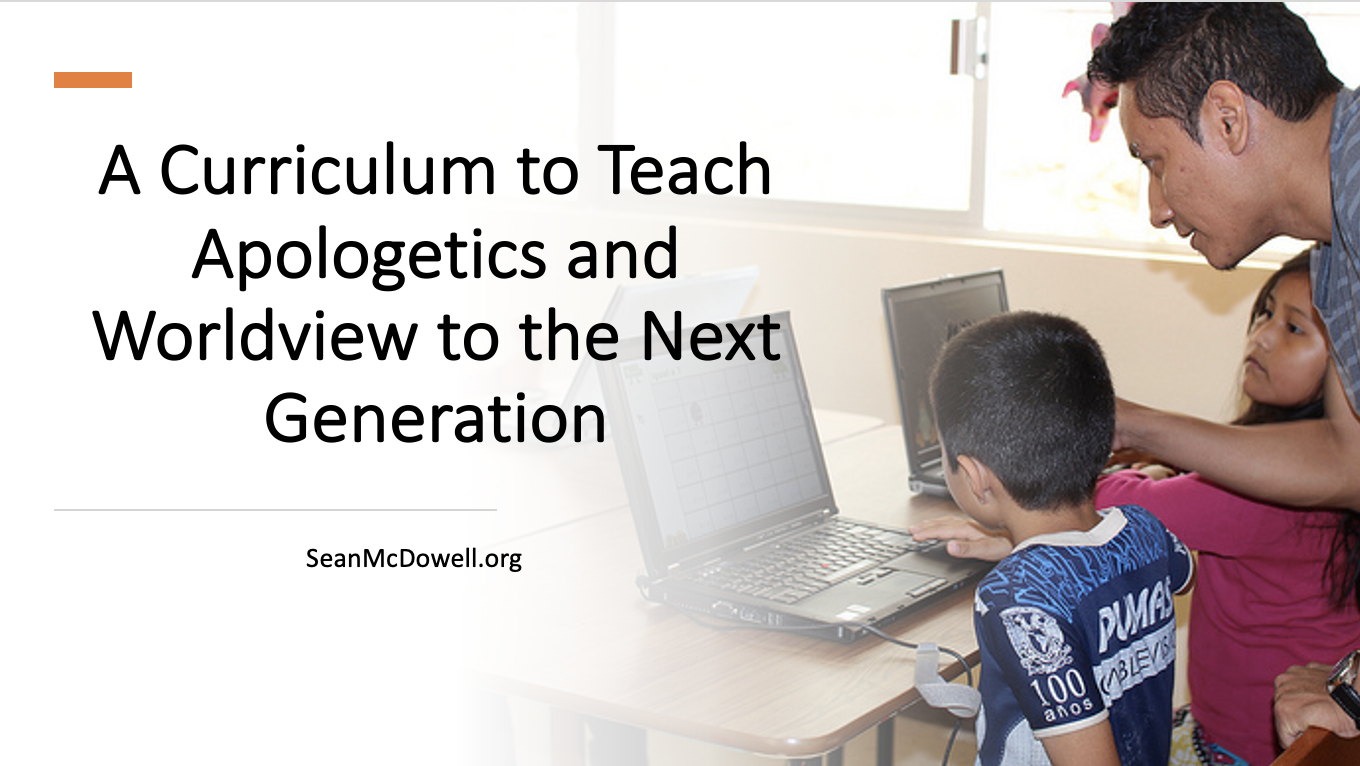Two years ago, I interviewed Elizabeth Urbanowicz (the Founder/CEO of Foundation Comparative Worldview Curriculum, and a former student of mine in the Talbot Apologetics program), about her new Bible curriculum for 3rd-6th graders. Well, she’s back with a new project that parents, youth workers, and Christian school educators need to hear about. Check it out!
SEAN MCDOWELL: What big concerns do you find parents facing as they seek to develop a biblical worldview in their children?
ELIZABETH URBANOWICZ: I frequently hear parents express concern that they can’t keep up with all the faulty ideas culture throws at their children. By the time many parents figure out how to address one false concept, a host of new ones have surfaced. It’s like that scene in I Love Lucy where the candies are traveling down the conveyer belt faster than Lucy and Ethel can grab them. Except in our culture, it’s not candy that’s bombarding our kids. It’s lies. And many parents feel like they are playing a losing game.
MCDOWELL: What do you see as the primary means of addressing this concern?
URBANOWICZ: If we want to prepare our children to seek truth, we need to give them transferrable skills they can use in any situation. It’s like teaching a teen to drive. We cannot drive our teens down every road they will one day navigate. But we can teach them defensive driving skills that will equip them to navigate any road wisely. Similarly, we cannot unmask every faulty idea our kids will encounter. But we can equip them with careful thinking skills to discern truth from error in any situation.
MCDOWELL: Are children capable of this type of thinking?
URBANOWICZ: I receive this question a lot. People are skeptical that kids can seek truth at such a young age. And I get it. Thinking skills are abstract, and abstract concepts are difficult for kids to grasp. The secret is to attach abstract concepts to concrete examples. For example, to think well, our kids must understand the Law of Non-Contradiction, which says that a truth-claim cannot be both true and false at the same time and in the same way. This definition would confuse most kids. However, if we first play a game of tag and have the adult monitoring say that the same child is out and not out, kids quickly understand that only one of two opposite claims can be true. Concrete examples like this help kids easily grasp the abstract!
MCDOWELL: What are practical steps for equipping children to think well?
URBANOWICZ: First, we must take a systematic approach. If we aren’t systematic, our children will have huge gaps in their ability to think well. The same is true in reading, mathematics, driving, shoe-tying, even potty-training. With any skill we want our kids to master, systematic instruction is a must. Repetition is also key. We often think that if we expose our kids to sound content once, it will stick with them. However, brain researchers have found that children need 5-7 exposures to the same content before it becomes part of their everyday thinking patterns. Repetition leads to transformation.
I know that most busy parents and teachers do not have time to plan out this type of systematic, repetitive instruction in careful thinking and worldview analysis. That is why I have a passion for curriculum writing. I want to provide busy parents and teachers with all the materials they need to systematically equip their kids to think well and do so with minimal prep time.
MCDOWELL: What kind of results have you seen with the parents and teachers using your first year of materials?
URBANOWICZ: It is exciting to hear how Foundation Worldview’s first year of content is transforming kids! One mom said, “We can’t watch a movie without the kids commenting on worldview. The same goes for books.” Other parents have shared how older siblings have started explaining to younger siblings why different ideas aren’t true. One mom shared how a boy in her daughter’s Sunday school class asked if Christians and Muslims worship the same God. When the teacher didn’t know how to respond, her twelve-year-old daughter explained the main differences in the Christian and Muslim concepts of God. It is so exciting to see kids take ownership of their thinking and evaluate ideas.
MCDOWELL: Can you tell me about the latest curriculum for kids? What makes it unique?
URBANOWICZ: Our latest curriculum, Foundation Careful Thinking Curriculum, trains ten-to-fourteen-year-olds to systematically evaluate every idea they encounter. The materials cover the basics of truth, knowledge, logic, evaluating sources, and communicating the truth in love. I know that sounds like a lot for kids and young teens to handle, but that is part of what makes these materials unique. We purposefully designed this curriculum to blend careful thinking strategies, brain research findings, and best practices in education. This combination makes challenging concepts accessible to children and teens and systematically transforms thinking patterns. We also have a new mini-series for 4-to-7-year-olds that will release this summer. We are thrilled to begin equipping even preschoolers to discern and follow truth!

